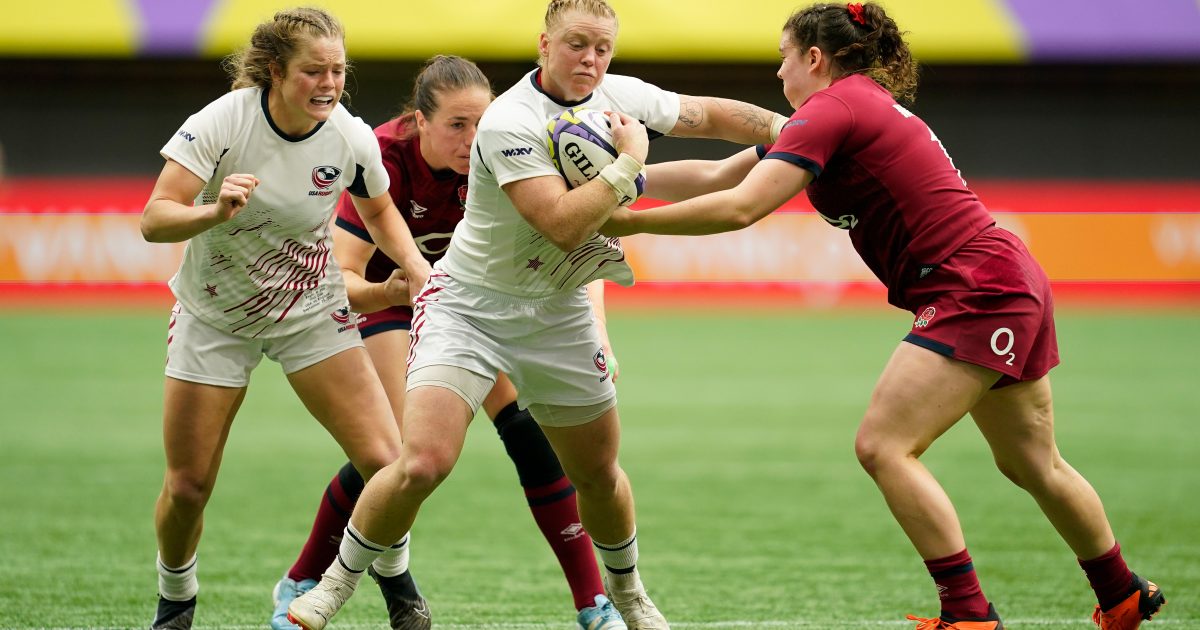L'Américaine Alev Kelter remportera sa 25e cape lors du match de WXV 1 contre la France

Sione Fukofuka a convoqué une équipe américaine largement inchangée pour affronter la France lors de la deuxième journée du WXV 1 samedi 5 octobre à Vancouver.
Lotte Sharp (née Clapp) débutera sur l’aile gauche à la place de Kris Thomas et Gabby Cantorna fera son entrée au poste de trois-quarts centre.
Cantorna complètera la paire avec Alev Kelter qui gagnera sa 25e cape au moment de passer seconde centre après avoir impressionné en portant le numéro 12 lors de la défaite contre l’Angleterre.
Kelter a fait ses débuts contre la France en 2016 et a participé à deux Coupes du Monde de Rugby en plus de trois éditions des Jeux olympiques avec l’équipe nationale à sept, notamment lors de leur campagne pour la médaille de bronze à Paris 2024 cet été.
La joueuse de 33 ans, qui jouera cette saison en Premiership Women’s Rugby avec les Loughborough Lightning, a marqué deux fois le week-end dernier contre l’Angleterre.
Kate Zackary, qui a marqué l’autre essai pour les États-Unis lors du premier week-end, conserve son poste de titulaire en troisième-ligne ainsi que le brassard de capitaine, épaulée par les vice-capitaines Rachel Johnson et Tess Feury.
Quatre places d’écart au classement mondial
La France est actuellement classée quatrième au classement mondial féminin World Rugby, tandis que les États-Unis abordent le match à la huitième place mondiale.
« En tant qu’équipe, nous avons été globalement satisfaits de nos 70 premières minutes face à l’Angleterre, mais nous voulons créer encore plus d’opportunités en attaque. L’entrée de Gabby Cantorna va donc nous permettre d’avoir une deuxième animatrice sur le terrain, ce qui va améliorer notre animation offensive dans notre système », explique l’entraîneur de l’équipe américaine, Sione Fukofuka.
« Alev est une porteuse de balle redoutable, et nous pensons que le couloir extérieur lui offrira des espaces où elle pourra être très efficace. Lotte revient après une excellente pré-saison aux Saracens. Elle apporte de l’expérience à l’arrière et représente une menace dès qu’elle touche le ballon.
« Nous savons que nous devons jouer à plein régime pendant 80 minutes cette semaine pour obtenir un bon résultat. Nous sommes bien conscientes que la France est une équipe très dangereuse qui présente des menaces partout, que ce soit avec son pack, à la charnière ou au centre. Nous avons donc travaillé intensivement sur notre vitesse de ligne et nos collisions.
« La semaine dernière, nous avons pu gratter beaucoup de ballons, et nous comptons bien remettre cette pression face à la France. En attaque, nous allons soigner nos lancements de jeu en mêlée et en touche pour créer le dynamisme nécessaire et libérer les menaces que nous avons sur les extérieurs. »
L’équipe des USA (contre la France) :
- Hope Rogers – Exeter Chiefs (48 sélections)
2. Kathryn Treder – Loughborough Lightning (23 sélections)
3. Charli Jacoby – Exeter Chiefs 30 (sélections)
4. Erica Jarrell – Sale Sharks (11 sélections)
5. Hallie Taufoou – Loughborough Lightning (20 sélections)
6. Tahlia Brody – Leicester Tigers (13 sélections)
7. Kate Zackary (C) – Ealing Trailfinders (38 sélections)
8. Rachel Johnson (VC) – Exeter Chiefs (30 sélections)
9. Taina Tukuafu Berkeley – All Blues (11 sélections)
10. McKenzie Hawkins – Colorado Gray Wolves (18 sélections)
11. Lotte Sharp Saracens – (16 sélections)
12. Gabby Cantorna – Exeter Chiefs (30 sélections)
13. Alev Kelter – Loughborough Lightning (24 sélections)
14. Cheta Emba – USA Sevens (10 sélections)
15. Bulou Mataitoga – Loughborough Lightning (19 sélections)Remplaçantes
16. Paige Stathopoulos – Beantown RFC (11 sélections)
17. Maya Learned – Colorado Gray Wolves (13 sélections)
18. Keia Mae Sagapolu – Leicester Tigers (12 sélections)
19. Rachel Ehrecke – Colorado Gray Wolves 16 sélections)
20. Tessa Hann – Colorado Gray Wolves 1 sélections)
21. Cassidy Bargell – Beantown RFC 2 sélections)
22. Nana Fa’avesi – USA Sevens 8 sélections)
23. Tess Feury (VC) – Leicester Tigers 29 sélections)
Cet article a été publié initialement en anglais sur RugbyPass.com et adapté en français par Willy Billiard.
Des billets pour la Coupe du Monde de Rugby féminine 2025 sont de nouveau en vente à partir de 10£ pour les adultes et 5£ pour les enfants. Foncez !





